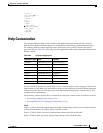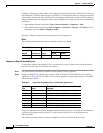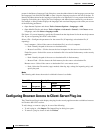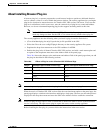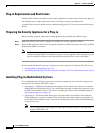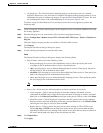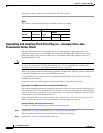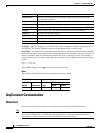
38-67
Cisco ASDM User Guide
OL-16647-01
Chapter 38 Clientless SSL VPN
Configuring Browser Access to Client-Server Plug-ins
About Installing Browser Plug-ins
A browser plug-in is a separate program that a web browser invokes to perform a dedicated function,
such as connect a client to a server within the browser window. The security appliance lets you import
plug-ins for download to remote browsers in Clientless SSL VPN sessions. Of course, Cisco tests the
plug-ins it redistributes, and in some cases, tests the connectivity of plug-ins we cannot redistribute.
However, we do not recommend importing plug-ins that support streaming media at this time.
Note Per the GNU General Public License (GPL), Cisco redistributes plug-ins without having
made any changes to them. Per the GPL, Cisco cannot directly enhance these plug-ins.
The security appliance does the following when you install a plug-in onto the flash device:
• (Cisco-distributed plug-ins only) Unpacks the jar file specified in the URL.
• Writes the file to the csco-config/97/plugin directory on the security appliance file system.
• Populates the drop-down menu next to the URL attributes in ASDM.
• Enables the plug-in for all future Clientless SSL VPN sessions, and adds a main menu option and
an option to the drop-down menu next to the Address field of the portal page.
Table 38-6 shows the changes to the main menu and address field of the portal page when you add
the plug-ins described in the following sections.
Note A secondary security appliance obtains the plug-ins from the primary security appliance.
When the user in a Clientless SSL VPN session clicks the associated menu option on the portal page, the
portal page displays a window to the interface and displays a help pane. The user can select the protocol
displayed in the drop-down menu and enter the URL in the Address field to establish a connection.
Note Some Java plug-ins may report a status of connected or online even when a session to the destination
service is not set up. The open-source plug-in reports the status, not the security appliance.
Before installing the first plug-in, you must follow the instructions in the next section.
Table 38-6 Effects of Plug-ins on the Clientless SSL VPN Portal Page
Plug-in Main Menu Option Added to Portal Page Address Field Option Added to Portal Page
ica Citrix Client citrix://
rdp Terminal Servers rdp://
ssh,telnet SSH ssh://
Telnet telnet://
vnc VNC Client vnc://







